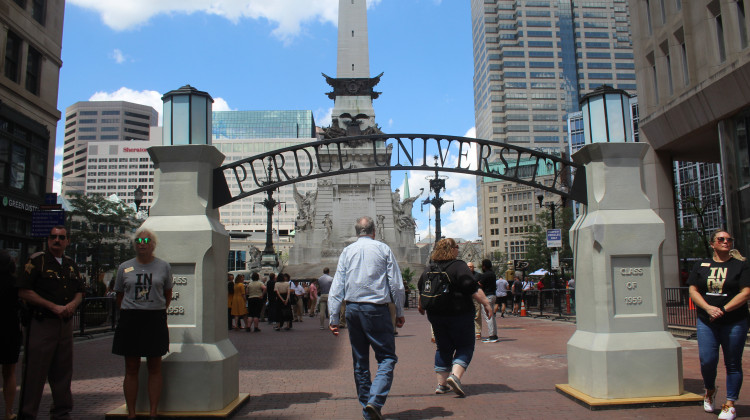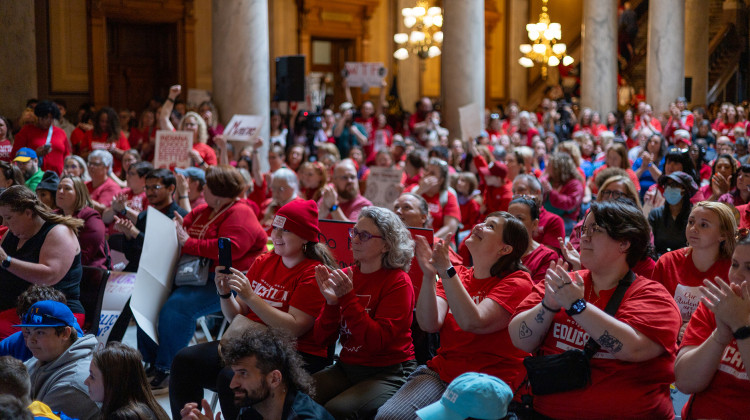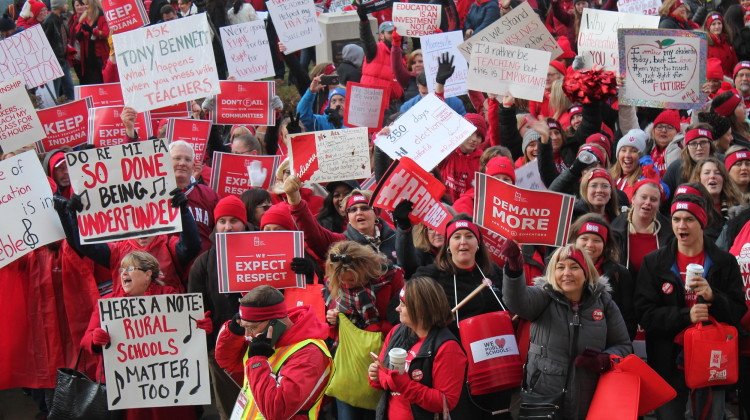At least 21 states and 145 school districts or other local governments have embraced what two legal scholars describe as discriminatory censorship laws. That’s according to new research authored by Boston University associate law professor Jonathan Feingold and West Virginia University law professor Joshua Weishart for the National Education Policy Center.
Feingold and Weishart say these laws often block students from engaging in discussions on racism, sexual orientation, gender identity and American history. They say these laws arose as a backlash against racial justice protests during the summer of 2020, and diversity, equity and inclusion measures adopted by schools and other organizations.
WFYI education reporter Lee Gaines spoke with professors Feingold and Weishart about their research — and their views on recent censorship legislation in Indiana.
This interview has been edited for length and clarity.
Lee Gaines: What is a discriminatory censorship law?
Jonathan Feingold: So when we use the term discriminatory censorship law, what we are referring to in the research brief, is a public act, which could be legislation passed by a legislative body that is designed to both demean inclusionary practices and pedagogy and curriculum, and to deny students access to targeted topics which tend to concern race and racism, sexual orientation and gender identity and American history.
Gaines: These laws have other names, right? Like I'm thinking about anti-CRT laws, for example.
Feingold: Others have and even I've used different terms. So in past scholarship, I've used the term ‘backlash bill,’ because these laws arose really as part of a broader backlash to the summer of 2020, and the global uprising for racial justice. But others like PEN America use the term: ‘educational gag order.’ Katheryn Russell Brown of the University of Florida has used the term ‘anti-literacy law.’ And all of these terms generally get at the censorship component of these laws. One reason why we wanted to attach discriminatory is because it's now undeniable that the laws are not just censoring in some neutral sense, but that they are targeting works and scholarship and frameworks that come from particular perspectives that tend to center the experiences of communities that have been historically the target of discrimination, harassment, and broader societal subordination.
Gaines: So I want to ask you specifically about a law that was passed in Indiana. So what this law does, is it makes it easier for community members to challenge books in schools and request their removal. It also strips educators of a legal defense against charges that they distributed harmful material to minors; they're no longer able to defend themselves on the basis of a book or a material's educational value. And so that law was driven by concerns from certain people in certain groups that schools were stockingpornographic material. But often the examples that were given were books that dealt with LGBTQ themes and characters. So is this an example of a discriminatory censorship law?
Feingold: It seems to be performing the function that we would consider discriminatory censorship. So, one is its proponents are rehearsing what are just patently bad faith talking points to try to demean certain people. So, members of the LGBTQ community, it has not been uncommon to hear people use terms like pornography, not to target literature that we should actually be concerned about, but to actually discredit legitimate lifestyles, and just people's actual existence. As you've described as well, the laws seem designed to empower a small minority to control what is happening in schools.
Joshua Weishart: So, I would say it is in line with the subject matter of our report, which is it's discriminatory, and that it's targeting certain subjects for regulation in the classroom. And in fact, the first teacher that was ever fired as a result of one of these discriminatory censorship laws was in Georgia. And she had read to her classroom a book that was exploring gender roles and identity. And she was fired by the school board for violating the law that regulates that classroom content. This was a book that had been approved by the Scholastic Book Fair, this was a book that had won an award. This was a book that her students wanted her to read. They chose and voted for her to read the book.
Just think about the self-censorship that this is inducing among teachers. And then are they going to receive complaints from parents and or are they going to receive some type of more formal punishment, including losing their jobs, perhaps.
Gaines: Can you unpack some of the threats to students and to education in general that these discriminatory censorship laws pose?
Feingold: So thinking about the threat to education in general: during the height of COVID, a very salient narrative was learning loss. The notion that is a function of being unable to attend schools in a traditional way, students were not able to learn as much as they traditionally would. COVID was unintended and the consequences were catastrophic. These discriminatory censorship laws, I tend to understand as manufactured learning loss. Their efforts to deprive students of a comprehensive, well rounded curriculum so that they can develop the critical thinking skills that they need to be productive members of a multiracial democracy.
This is a feature that the proponents are explicit about. It is about ridding schools of a comprehensive curriculum. The basic threat is that we are depriving students, future leaders of the knowledge and critical thinking skills they need to actually be responsible members of their communities.
And then in terms of the impact on students on teachers from the beginning, the proponents of these laws clearly held antagonistic views to the modest anti-racist reforms that we saw coming out of the summer of 2020. And so one thing that we note in the report is that many school districts in that summer tried to look introspectively and to identify the different ways in which race and racism might manifest unintentionally within their own institutions. And that happens often in part just by the curriculum that students read, whether or not students in their communities are centered in the curriculum, whether the curriculum is telling a full story of the United States that is not whitewashing history. Not only is that better learning, but you have a lot of research from social scientists that suggest a curriculum that is more multiracial, multi ethnic actually leads to greater engagement from everyone.
But then when you have laws that don't just prohibit that sort of curriculum, but actually demean it. When you have politicians that are really grotesquely mischaracterizing the basic information about the history of racism in the United States, about gender identity, that clearly is not just intended to tarnish the curriculum, but also the communities themselves. And so I think that naturally and predictably creates, and what the evidence bears out, institutional environments in which students and other members of targeted communities are more likely to confront either subtle or more hostile manifestations of what we would just traditionally think of as harassment, whether it's gender-based or race-based.
Gaines: Do you see more states passing this or states passing additional discriminatory censorship laws in the coming year? Or do you think that this is slowing down?
Weishart: We see no evidence that it's slowing down, we anticipate it's going to continue. And if we don't act to prevent or mitigate these types of discriminatory censorship laws, we're going to find ourselves in a nation that's divided into essentially two systems of education. One system that will be committed to public education in the fullest sense, that is committed to critical thinking, inclusion, a safe learning environment, and another system that is plagued by this type of educational censorship by the discrimination and miseducation.
And when you write discrimination into the law, that provokes the type of legal challenge that pits courts against the other political branches. And too often courts are the first to blink in these interbranch showdowns because the law otherwise grants legislative bodies, executive agencies have the prerogative to decide education policy, including the curriculum, and the classroom instruction. And so now there have been several high profile legal challenges to these discriminatory censorship laws, but not the wave of litigation that you would have expected. We're confident that there are going to be more court battles down the road. But we are far less confident that these lawsuits are going to swiftly and decisively resolve these issues. And they're certainly not going to remedy the harm that they've already caused.
Gaines: So what are some of the solutions here? I know this is a highly partisan issue, but for regular people who are concerned about this, or who might live in one of these states, what are some of the options to fight against some of these discriminatory censorship laws?
Weishart: Well, for everyday parents and those who are concerned about public education, I think what they could do is they could show up to the school board meetings where these laws are often adopted, or at least discussed, or where you have the Moms for Liberty type groups seeking to ban materials. They could show up and defend. And I think many are, in fact. And they could run for school board, and they could get involved in those sorts of ways.
But we call on our political leaders to do more as well. And so the report recommends at the national level that Congress hold congressional hearings on these types of laws and their impact on students. We also demand that the U.S. Department of Education issues legal guidance and investigates civil rights complaints. At the state and local level, and particularly in blue and purple states and cities, they need to lead here and not just sit back and watch half the country fall under that regime of discriminatory censorship. They need to lead by affirmatively endorsing anti-racism pedagogy and curriculum and adopting a more inclusive education and culturally sensitive materials in their education. And we also call on civil rights and education advocacy groups to support teachers, and we suggest a variety of recommendations there, including a national hotline where teachers could get support and guidance, a legal defense fund for when they come under fire and have to defend themselves, a network of lawyers who are willing to step in and support them and to challenge these laws. And we also encourage groups to prepare and disseminate curriculum that would allow teachers to provide a comprehensive and truthful account of their subject matters.
 DONATE
DONATE







 Support WFYI. We can't do it without you.
Support WFYI. We can't do it without you.